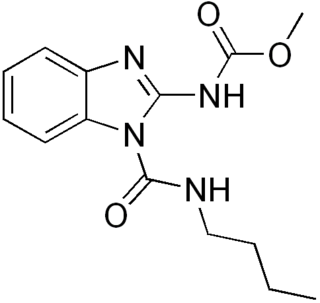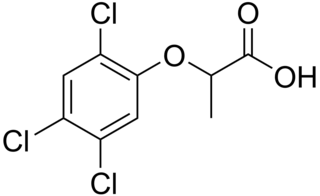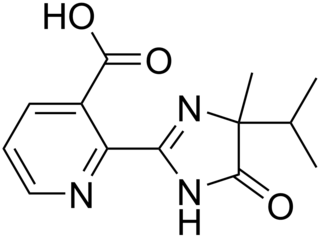Related Research Articles

Herbicides, also commonly known as weedkillers, are substances used to control undesired plants, also known as weeds. Selective herbicides control specific weed species, while leaving the desired crop relatively unharmed, while non-selective herbicides can be used to clear waste ground, industrial and construction sites, railways and railway embankments as they kill all plant material with which they come into contact. Apart from selective/non-selective, other important distinctions include persistence, means of uptake, and mechanism of action. Historically, products such as common salt and other metal salts were used as herbicides, however these have gradually fallen out of favor and in some countries a number of these are banned due to their persistence in soil, and toxicity and groundwater contamination concerns. Herbicides have also been used in warfare and conflict.
Roundup is the brand name of a systemic, broad-spectrum glyphosate-based herbicide originally produced by Monsanto, which Bayer acquired in 2018. Glyphosate is the most widely used herbicide in the United States. As of 2009, sales of Roundup herbicides still represented about 10 percent of Monsanto's revenue despite competition from Chinese producers of other glyphosate-based herbicides. The overall Roundup line of products, which includes genetically modified seeds, represented about half of Monsanto's yearly revenue. The product is marketed to consumers by Scotts Miracle-Gro Company.
E. I. du Pont de Nemours and Company, commonly referred to as DuPontalso, was an American company that was founded in July 1802 in Wilmington, Delaware, as a gunpowder mill by French-American chemist and industrialist Éleuthère Irénée du Pont de Nemours.
Danisco A/S is a Danish bio-based company with activities in food production, enzymes and other bioproducts as well as a wide variety of pharmaceutical grade excipients. It was formed in 1989 from the largest Danish industrial merger ever of the two old C.F. Tietgen companies Danish Sugar, and Dansk Handels- og Industri Company.

MCPA is a powerful, selective, widely used phenoxy herbicide. The pure compound is a brown-colored powder. MCPA has been extensively used in agriculture to control broad-leaf weeds as a growth regulator primarily in pasture and cereal crops field since 1945. The mode of action of MCPA is as an auxin, which are growth hormones that naturally exist in plants. Overdose application of MCPA acts as an herbicide and results in abnormal growth.

Alachlor is an herbicide from the chloroacetanilide family. It is an odorless, white solid. The greatest use of alachlor is for control of annual grasses and broadleaf weeds in crops. Use of alachlor is illegal in the European Union and no products containing alachlor are currently registered in the United States.

The Federal Insecticide, Fungicide, and Rodenticide Act (FIFRA) is a United States federal law that set up the basic U.S. system of pesticide regulation to protect applicators, consumers, and the environment. It is administered and regulated by the United States Environmental Protection Agency (EPA) and the appropriate environmental agencies of the respective states. FIFRA has undergone several important amendments since its inception. A significant revision in 1972 by the Federal Environmental Pesticide Control Act (FEPCA) and several others have expanded EPA's present authority to oversee the sales and use of pesticides with emphasis on the preservation of human health and protection of the environment by "(1) strengthening the registration process by shifting the burden of proof to the chemical manufacturer, (2) enforcing compliance against banned and unregistered products, and (3) promulgating the regulatory framework missing from the original law".

Benomyl is a fungicide introduced in 1968 by DuPont. It is a systemic benzimidazole fungicide that is selectively toxic to microorganisms and invertebrates, especially earthworms, but nontoxic toward mammals.

Diquat is the ISO common name for an organic dication that, as a salt with counterions such as bromide or chloride is used as a contact herbicide that produces desiccation and defoliation. Diquat is no longer approved for use in the European Union, although its registration in many other countries including the USA is still valid.
Invista, headquartered in Wichita, Kansas, United States, is a fiber, resin and intermediates company. It has about 10,000 employees in over 20 countries worldwide. The predecessor DuPont Textiles and Interiors was formed from DuPont's textile fibers division in February 2003. The company was given the trademarked name INVISTA and was then sold to privately owned Koch Industries on April 30, 2004 for US$4.2 billion. Koch Industries combined the newly acquired organization with their KoSa subsidiary to complete the INVISTA company.

Phenoxy herbicides are two families of chemicals that have been developed as commercially important herbicides, widely used in agriculture. They share the part structure of phenoxyacetic acid.

Fenoprop, also called 2,4,5-TP, is the organic compound 2-(2,4,5-trichlorophenoxy)propionic acid. It is a phenoxy herbicide and a plant growth regulator, an analog of 2,4,5-T in which the latter's acetic acid sidechain is replaced with a propionate group (with an extra CH3). The addition of this extra methyl group creates a chiral centre in the molecule and useful biological activity is found only in the (2R)-isomer. The compound's mechanism of action is to mimic the growth hormone indoleacetic acid (IAA). When sprayed on plants it induces rapid, uncontrolled growth. As with 2,4,5-T, fenoprop is toxic to shrubs and trees. The name Silvex was used in the USA but it has been banned from use there since 1985. According to the Environmental Protection Agency its greatest use was as a postemergence herbicide for control of woody plants, and broadleaf herbaceous weeds in rice and bluegrass turf, in sugarcane, in rangeland improvement programs and on lawns. Fenoprop and some of its esters were in use from 1945 but are now obsolete.

Dicamba is a broad-spectrum herbicide first registered in 1967. Brand names for formulations of this herbicide include Dianat, Banvel, Diablo, Oracle and Vanquish. This chemical compound is a chlorinated derivative of o-anisic acid.

Imazapyr is a non-selective herbicide used for the control of a broad range of weeds including terrestrial annual and perennial grasses and broadleaved herbs, woody species, and riparian and emergent aquatic species. It is used to eliminate Lithocarpus densiflorus and Arbutus menziesii. Additionally, imazapyr is used to control annual and perennial grass and broadleaved weeds, brush, vines and many deciduous trees. Imazapyr is absorbed by the leaves and roots, and moves rapidly through the plant. It accumulates in the meristem region of the plant. In plants, imazapyr disrupts protein synthesis and interferes with cell growth and DNA synthesis.

Bensulide is a selective organophosphate herbicide. It is one of a few organophosphate compounds that are used as an herbicide. Most of the others are used as insecticides. It is used on vegetable crops such as carrots, cucumbers, peppers, and melons and in cotton and turfgrass to control annual grasses such as bluegrass and crabgrass and broadleaf weeds. It is often applied before the weed seeds germinate (pre-emergence) in order to prevent them from germinating. It is available as granules or an emulsifiable concentrate. Estimates place the total use of bensulide in the United States at about 632,000 pounds annually. Application rates may be relatively heavy when it is used. The EPA classifies bensulide as a general use pesticide.

Mesotrione is the ISO common name for an organic compound that is used as a selective herbicide, especially in maize. A synthetic inspired by the natural substance leptospermone, it inhibits the enzyme 4-hydroxyphenylpyruvate dioxygenase (HPPD) and is sold under brand names including Callisto and Tenacity. It was first marketed by Syngenta in 2001.

2,4-Dichlorophenoxyacetic acid is an organic compound with the chemical formula C8H6Cl2O3 which is usually referred to by its ISO common name 2,4-D. It is a systemic herbicide which kills most broadleaf weeds by causing uncontrolled growth in them but most grasses such as cereals, lawn turf, and grassland are relatively unaffected.

Aminocyclopyrachlor is a selective, low-toxicity herbicide that provides pre- and post-emergent control of broadleaf weeds, woody species, vines and grasses on several non-food use sites, such as rights of way, wildlife management areas, recreational areas, turf/lawns, golf courses and sod farms. It was conditionally registered as Imprelis by DuPont in August 2010, and first used in Fall 2010. The chemical is a systemic herbicide and acts by disrupting gene expression. This causes undifferentiated cell division and elongation.

Bentazon is a chemical manufactured by BASF Chemicals for use in herbicides. It is categorized under the thiadiazine group of chemicals. Sodium bentazon is available commercially and appears slightly brown in colour.
Glyphosate-based herbicides are usually made of a glyphosate salt that is combined with other ingredients that are needed to stabilize the herbicide formula and allow penetration into plants. The glyphosate-based herbicide Roundup was first developed by Monsanto in the 1970s. It is used most heavily on corn, soy, and cotton crops that have been genetically modified to be resistant to the herbicide. Some products include two active ingredients, such as Enlist Duo which includes 2,4-D as well as glyphosate. As of 2010, more than 750 glyphosate products were on the market. The names of inert ingredients used in glyphosate formulations are usually not listed on the product labels.
References
- ↑ "Product label" (PDF). Archived from the original (PDF) on September 5, 2011.
- ↑ "MSDS" (PDF). Archived from the original (PDF) on May 10, 2011.
- ↑ "Aminocyclopyrachlor| Pesticides | US EPA". Archived from the original on 2011-11-15. Retrieved 2012-05-21.
- 1 2 "Archived copy". Archived from the original on 2012-10-10. Retrieved 2011-09-17.
{{cite web}}: CS1 maint: archived copy as title (link) - ↑ "Imprelis® Facts | DuPont". Archived from the original on 2011-09-27. Retrieved 2011-09-17.
- ↑ "E.I. DuPont de Nemours and Company Imprelis Order Settlement | Compliance and Enforcement | US EPA". Archived from the original on 2012-05-02. Retrieved 2012-05-21.
- 1 2 3 "Detroit Free Press". May 21, 2012. p. A1.
- ↑ "Detroit Free Press". Aug 12, 2011. p. A1.